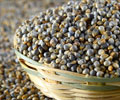Highlights
- Celiac disease is a genetic autoimmune disorder in which consumption of gluten causes damage to the small intestine
- People with celiac disease should avoid eating gluten-containing foods such as wheat, rye and barley
- The prevalence of celiac disease has remained stable in the past few years
- But, people without celiac disease are following a gluten-free diet, claims a new study
Adherence to Gluten-Free Diet
Lead author Dr. Hyun-seok Kim, Rutgers New Jersey Medical School, Newark, and coauthors conducted the study. The researchers analyzed data from the National Health and Nutrition Examination Surveys (NHANES) 2009 to 2014. The survey included 22,278 participants over the age of six and had undergone blood tests for celiac disease. The participant's information about the prior diagnosis of celiac disease and adherence to a gluten-free diet was collected in a direct interview.The prevalence of celiac disease has remained stable in the recent years (0.70 percent in 2009-2010, 0.77 percent in 2011-2012 and 0.58 percent in 2013-2014). However, the adherence to the gluten-free diet by people without celiac disease has increased (0.52 percent in 2009-2010, 0.99 percent in 2011-2012 and 1.69 percent in 2013-2014). The authors noted that the stable prevalence of celiac disease and increased adherence to a gluten-free diet might be related because decreased gluten consumption could be contributing to the plateau in celiac disease.
The increase in consumption of gluten-free diet by people without celiac disease could be due to factors such as
- Increased availability of gluten-free products
- Self-diagnosis of gluten sensitivity
- Increased perception that it may be healthier
The study is published in the JAMA Internal Medicine.
Celiac Disease
Gluten-Free Diet
The Pros and Cons of a Gluten-Free Diet
Pros
- Promotes weight loss
- Insulin resistance
- Reduces inflammation
- Reduces consumption of processed foods
- Low fiber
- Lack of essential nutrients
- Causes folate deficiency
- What is Celiac Disease https://celiac.org/celiac-disease/understanding-celiac-disease-2/what-is-celiac-disease/
- Celiac Disease http://www.mayoclinic.org/diseases-conditions/celiac-disease/home/ovc-20214625
















